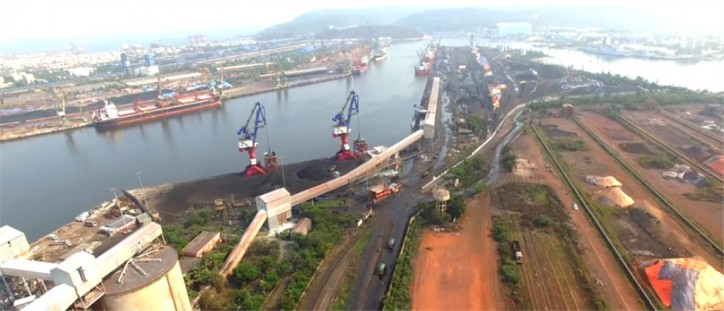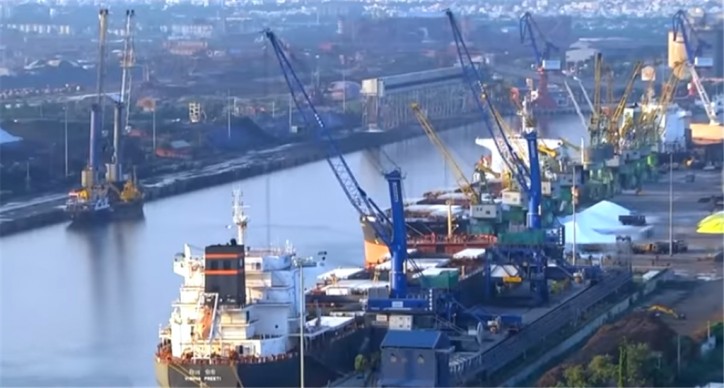- Capacity of terminal (outer harbour) to increase from 12.5 MTPA to 23 MTPA, with one of the highest loading rates
- Post expansion port will be able to berth vessels up to 200,000 DWT, with a draft of 18 metres
- Iron ore loading rate to increase from 70,000 TPD to 120,000 TPD—an increase of more than 70%
- Project has potential to increase Essar Ports’ third-party cargo share to more than 40%
- Essar has drastically reduced spillage rate to 0.18%, and is striving to achieve near zero levels
- Vizag Port on way to becoming world-class facility that is a zero-emission, contamination-free zone
Essar Ports, India’s second-largest private port operator that has an operational capacity of 82 MTPA, yesterday announced that its Rs 830-crore expansion plan to upgrade the iron ore handling capacity of the Vizag Terminal (outer harbour) from 12.5 MMTPA to 23 MMTPA is nearing completion. On completion, the upgraded terminal will have a loading rate of 8,000 TPH (tonnes per hour), which will be among the highest for an Indian port.

Essar Vizag Terminals Limited (EVTL) took over the project in May 2015 on a Design-Build-Finance-Operate-Transfer (DBFOT) basis for a period of 30 years. Since then, the company has ramped up the iron ore loading capacity of the terminal from 25,000 TPD (tonnes per day) to 70,000 TPD. After the completion of the upgradation-cum-modernisation project, the loading capacity will increase to 120,000 TPD, and the facility will be able to berth vessels up to 200,000 DWT, with a draft of 18 metres, on the outer harbour.
Modernised facilities
EVTL’s Iron Ore Handling Terminal at Vizag Port is an all-weather deep draft facility that has the wherewithal to serve the rapidly growing markets of South East Asia, including China, Japan, and Korea. The project facilities are state-of-the-art and require minimal human intervention. They include:
Receiving System: Completely mechanised facilities that comprise high capacity wagon tipplers for receiving cargo by rakes, and one of the longest integrated conveyor systems that transfer cargo to a stackyard that has high capacity multiple stackers. The stackyard has a capacity to store 0.6 MT of cargo.
Shipping System: The system comprises high capacity reclaimers to load vessels up to Capesize through ship loaders. It is one of fastest loading systems ever seen in an Indian port.

Green focus
An increased focus on global best practices and sustainable environment protection has reduced spillage to a mere 0.18% at the terminal. EVTL is aiming to bring this number down to zero, which will result in lower emissions and a cleaner environment. A 9.3-km open conveyor has been covered. Its junction houses that pass through the old town have been protected with cladding, and a “cold fog” system implemented at each junction house to further reduce the pollution. Cold fog (of ECODEA) is an advanced technology that uses ruby-orifice nozzles to create extremely fine water droplets of 1-15 microns, as opposed to the 100-250 micron droplet size prevalent in typical water sprinkling systems. The entire system has been upgraded from manual operations to a PLC-based automated system (of Honeywell make), which ensures a safe and secure environment for the workforce. The electric substation uses the latest hybrid technology and adds to the safety quotient.
Mr Rajiv Agarwal, Managing Director, Essar Ports, noted: “The facility is one of a kind in India with a state-of-the-art mechanised system, and one of the highest loading rates (8,000 TPH). It has significant potential to increase our share of third-party cargo business to more than 40%. As a result of the enhanced performance parameters, exporters on the east coast will benefit immensely from shorter turnaround times, which will translate into competitive freight costs.”
“We aim to be the preferred choice of exporters in eastern India,” said Mr CH Satyanand, CEO, Essar Vizag Port, adding: “The communities around the facility will benefit from the upgradation of the technology stack at the port. We are determined to cut down spillage and emissions to virtually near-zero levels.”
Source: Essar